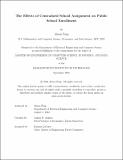| dc.contributor.advisor | Angrist, Joshua D. | |
| dc.contributor.author | Fang, Alison | |
| dc.date.accessioned | 2024-10-09T18:25:41Z | |
| dc.date.available | 2024-10-09T18:25:41Z | |
| dc.date.issued | 2024-09 | |
| dc.date.submitted | 2024-10-07T14:34:38.109Z | |
| dc.identifier.uri | https://hdl.handle.net/1721.1/157165 | |
| dc.description.abstract | An important benefit of modern school choice programs may be increased retention of students in large urban districts. Enrollment effects of choice frameworks are especially important today, as traditional public school enrollment as a share of total enrollment has fallen sharply since the pandemic. This paper asks whether and how the design of centralized assignment schemes, such as those used in numerous large urban districts, affects enrollment. Specifically, I focus on the question of how unified enrollment programs impact enrollment choice between traditional public schools, charter schools, and private schools. Using syn- thetic controls and event study models, this analysis suggests that the adoption of unified enrollment systems boosts charter enrollment as well as overall public school enrollment. At the same time, effect sizes vary across individual districts, and school choice policy should be mindful of the particular circumstances of each district. | |
| dc.publisher | Massachusetts Institute of Technology | |
| dc.rights | In Copyright - Educational Use Permitted | |
| dc.rights | Copyright retained by author(s) | |
| dc.rights.uri | https://rightsstatements.org/page/InC-EDU/1.0/ | |
| dc.title | The Effects of Centralized School Assignment on Public School Enrollment | |
| dc.type | Thesis | |
| dc.description.degree | MNG | |
| dc.contributor.department | Massachusetts Institute of Technology. Department of Electrical Engineering and Computer Science | |
| dc.identifier.orcid | http://orcid.org/0009-0000-6698-0601 | |
| mit.thesis.degree | Master | |
| thesis.degree.name | | |
